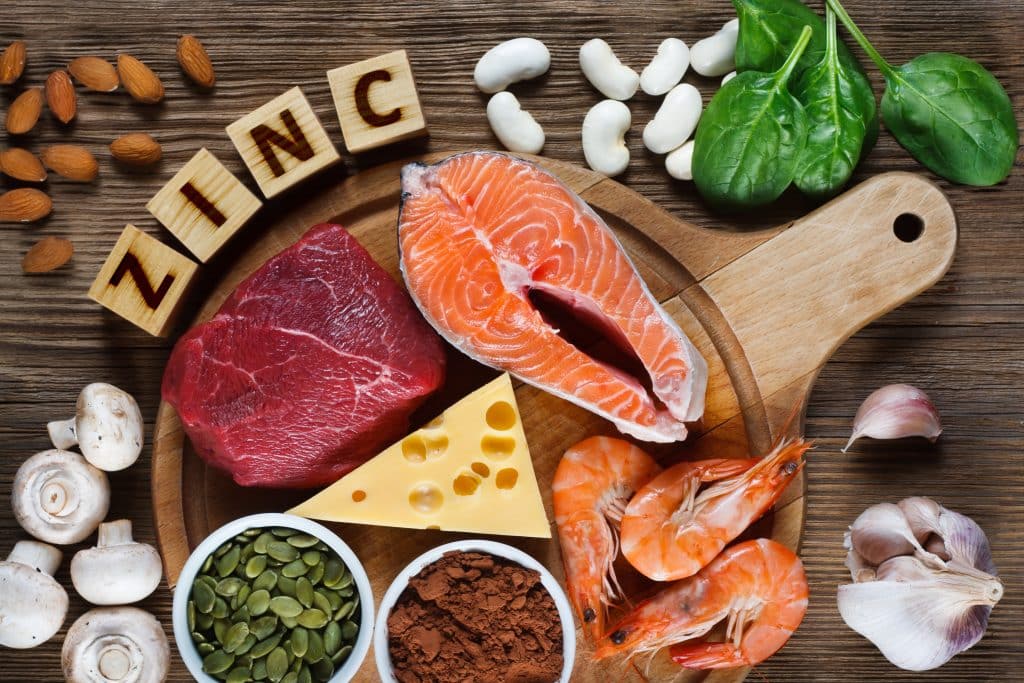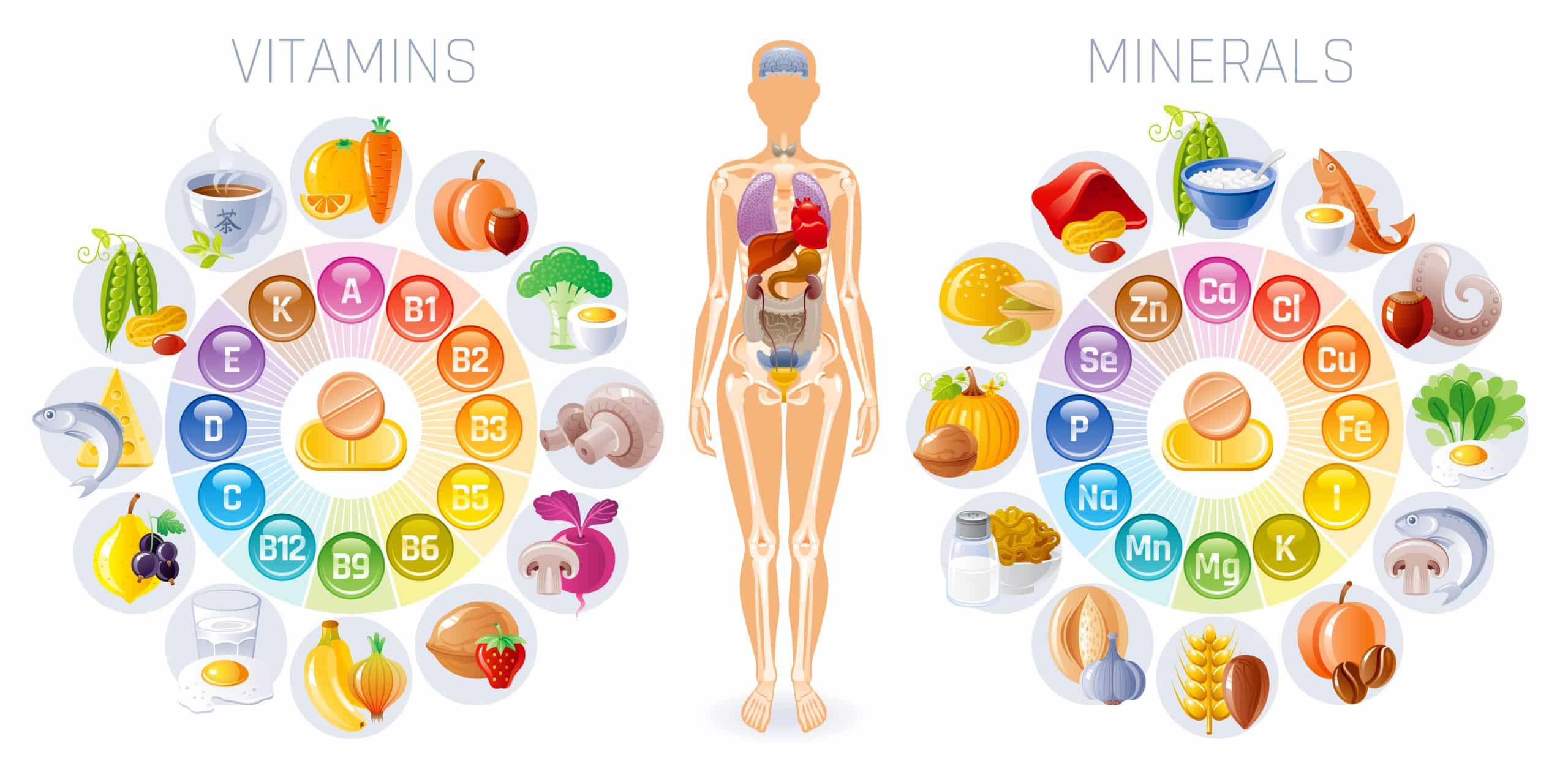Autoimmune conditions are associated with a number of common mineral deficiencies and vitamin deficiencies, including magnesium, zinc, selenium, copper, iron, and vitamins B12, and D. Additionally, a high percentage of the population is deficient in calcium, potassium, vitamins A, and C.1
Minerals are essential for good health and help to maintain the body’s various functions. Unfortunately, many of us do not get enough minerals through our diet, leading to deficiencies that can cause a variety of symptoms and even lead to serious health conditions if left untreated.
Iron is a mineral that helps the body create hemoglobin, which is essential for carrying oxygen to the cells. Iron deficiency can lead to anemia, fatigue, hair loss, and brittle nails. It is especially common among women of childbearing age and pregnant women due to increased blood production during pregnancy.2
Zinc deficiency can cause impaired growth and development. It may also weaken the immune system, leading to an increased risk of infection. Symptoms may include diarrhea, poor appetite, and hair loss.3
Magnesium is a mineral necessary for energy production and cell growth. It also helps regulate blood pressure and protect bones from osteoporosis. Magnesium deficiency can cause muscle cramps, fatigue, insomnia, anxiety, and irregular heart rhythm.4
Potassium is an essential mineral for the body and is one of the most common minerals found in food. It helps regulate fluid balance, muscle contractions, and nerve impulses. It also plays a role in blood pressure control and heart health.5
Calcium is critical for bone health and helps the body with muscle contractions, nerve function, and hormone secretion. Calcium deficiency can lead to weak bones and teeth, increased risk of fractures, and even depression. Symptoms may include numbness or tingling in the hands and feet, muscle cramps, fatigue, poor appetite, dry skin, and hair loss.6
Copper is an essential trace mineral that plays a role in many physiological processes. It is important for both the development and maintenance of healthy bones, connective tissue, blood vessels, and skin. Copper contributes to the insulation of nerves, helps synthesize collagen, and enables the absorption of iron from food sources. It also supports enzymatic reactions involved in energy production and the metabolism of proteins, carbohydrates, and fats. Copper is also essential for reproductive health in both men and women.7
Selenium is an essential trace element required by the body in small amounts for the proper functioning of its numerous metabolic pathways. Its role in the body is particularly important for thyroid hormone metabolism, as it helps to convert thyroxine (T4) into its active form, triiodothyronine (T3). Selenium also plays a part in immune system functioning and may help reduce inflammation. Additionally, selenium acts as an antioxidant by helping to protect cells from damage caused by free radicals.8

Iron
Iron deficiency is one of the most common mineral deficiencies. It can cause anemia, fatigue, and weakness. Iron is a critical component of hemoglobin, which carries oxygen throughout your body. Without enough iron, your body won’t get enough oxygen to function properly. To prevent iron deficiency, eat foods that are high in iron such as grass-fed red meat, organic, free-range poultry, and dark green leafy vegetables.2
Autoimmune conditions associated with low iron levels include Myasthenia Gravis, Hashimoto’s thyroiditis, and Graves’ disease.
Zinc
Zinc is an essential mineral for human health, and a deficiency can cause a wide range of physical and mental symptoms. The primary dietary sources of zinc are animal proteins, such as red meat, poultry, seafood, eggs, milk, cheese, nuts, and seeds. Vegetarians may be at greater risk of zinc deficiency due to their avoidance of animal proteins.
Zinc is necessary for the proper functioning of many enzymes, hormones, and proteins in the body, as well as healthy skin and hair. Signs and symptoms of zinc deficiency include impaired growth, lack of appetite, thinning hair, reduced taste, and smell sensation, diarrhea, delayed wound healing, impaired night vision, and white spots on the nails. A severe zinc deficiency can lead to poor immune function and an increased risk of infection.
The recommended daily intake of zinc for adults is 11 milligrams per day for males and 8 milligrams per day for females. To prevent a zinc deficiency, eat foods that are rich in zinc such as grass-fed beef, pumpkin seeds, cashews, cheese, and oysters.3
Autoimmune conditions associated with low zinc levels include Graves’ disease.

Magnesium
Magnesium deficiency is one of the most common mineral deficiencies, as it affects around 60% of the United States population.9 Signs and symptoms of magnesium deficiency can include fatigue, muscle cramps, insomnia, anxiety, depression, poor digestion, irregular heartbeat, and high blood pressure.
Magnesium plays a role in many bodily functions including the proper functioning of muscles and nerves, regulating blood sugar levels, and maintaining healthy bones. To prevent or treat magnesium deficiency it is important to eat foods rich in magnesium such as green leafy vegetables, nuts and seeds, and fish.
Even more important, without enough magnesium, vitamin D isn’t able to function properly. Since low vitamin D levels and autoimmune conditions go hand in hand, adequate magnesium consumption is critically important.10
Commercially farmed food is largely produced in an unsustainable way, which means it often lacks essential minerals like magnesium. This is because the soil has been stripped of its natural nutrients and replaced with only a few minerals. As a result, the nutritional value of commercially farmed food is lower than that of organically grown produce. This means that you’re likely not getting enough magnesium when eating commercially farmed food.
In addition to consuming organic food, taking a supplement can ensure adequate levels of magnesium in the body. Additionally, regular exercise can help your body absorb more magnesium from the food you eat. With proper nutrition and supplementation, magnesium deficiency can be prevented or treated.4
Potassium
The body needs potassium to maintain a healthy balance of electrolytes, which are minerals that carry an electrical charge. Potassium is found in a variety of foods including bananas, oranges, potatoes, and beans. It is also found in foods such as apricots, avocados, dates, figs, kale, spinach, and Swiss chard.
A deficiency in potassium can lead to a variety of symptoms including fatigue, muscle cramps, constipation, and an irregular heartbeat. If a deficiency is not addressed it can lead to more serious health problems such as high blood pressure, stroke, or kidney failure.
The best way to ensure that your body gets enough potassium is by eating a balanced diet that includes plenty of fruits, vegetables, grass-fed meat, and grass-fed dairy.5
Calcium
Calcium is a mineral found in the human body, and it plays an important role in many bodily functions. It helps maintain strong bones and teeth, regulates muscle contraction, aids in nerve impulse transmission, and helps to control blood pressure. Most people need 1,000-1,200 mg of calcium per day for optimal health.
The most common causes of calcium deficiency are dietary deficiencies, inadequate absorption, and poor utilization of the mineral. Some medical conditions can also lead to a decrease in the body’s ability to absorb or utilize calcium. People who don’t get enough dietary calcium may suffer from fractures, joint pain, nerve problems, muscle cramping, fatigue, weakened immune systems, and other health issues.
To prevent a calcium deficiency, individuals should eat or drink foods that are rich in calcium, such as dairy products, dark leafy greens, and fish with soft bones like sardines.6
Copper
Copper is an essential trace element required for the production of red blood cells, proper nerve and bone growth, maintenance of healthy connective tissues, and other vital functions. Inadequate intake or absorption of copper can result in anemia, impaired growth, a weakened immune system, brittle bones, skin irritation, and hair loss.
The best sources of copper are organ meats, seafood, nuts, and leafy green vegetables.7
Selenium
Selenium is an important trace mineral that has been shown to be beneficial in reducing inflammation associated with autoimmune conditions. It is also important for cellular health, thyroid function, and metabolic processes. Selenium may help to improve cardiovascular health. Additionally, it has been found to play a role in improving fertility, reducing depression, and boosting the body’s natural antioxidant systems.
Selenium can be found in foods such as Brazil nuts, seeds, mushrooms, fish, and eggs. Brazil nuts are such a rich source of selenium that consuming only 2 a day provides sufficient selenium intake.11 However, it is difficult for most people to get enough selenium from food alone. If you aren’t consuming Brazil nuts, a dietary supplement will ensure that you’re getting an adequate amount of selenium in your diet.8
Autoimmune conditions associated with low selenium levels include Hashimoto’s thyroiditis, and Graves’ disease.

Vitamin A is important for maintaining a healthy immune system and a deficiency can lead to an increased risk of autoimmune conditions. Vitamin B12 is essential for proper neurological and immune system functioning, and deficiencies can increase the risk of autoimmune disorders. Vitamin C is important for fighting infections and reducing inflammation, while vitamin D helps to regulate the body’s immune response. Deficiencies in any of these vitamins can contribute to an increased risk of developing or exacerbating an autoimmune condition.
Vitamin A
Vitamin A is an essential nutrient. Symptoms of Vitamin A deficiency include vision problems such as night blindness, dry eyes, poor growth, delayed healing of wounds, increased susceptibility to infections, and even death in severe cases.
The best dietary sources of vitamin A are liver, eggs, and certain types of fish. Fruits and vegetables such as carrots, sweet potatoes, spinach, kale, cantaloupe, papaya, and mangos are also excellent sources of beta-carotene that the body can convert into vitamin A.12 13
Vitamin B12
Vitamin B12 is an important nutrient for our bodies, and deficiencies are most common among vegetarians and vegans. It aids in DNA synthesis, red blood cell formation, and neurological functions. Symptoms of a Vitamin B12 deficiency include fatigue, numbness or tingling in the hands and feet, depression, confusion, and difficulty concentrating. Eating foods that are rich in B12, such as fish, grass-fed meat, eggs, and dairy products can help reverse this deficiency.14
Autoimmune conditions associated with low vitamin B12 levels include Sjögren’s Syndrome, Crohn’s Disease, Hashimoto’s thyroiditis, and chronic fatigue syndrome.
Vitamin C
Vitamin C is an essential nutrient that helps the body to absorb iron, maintain healthy skin and blood vessels, and fight against infection. It also helps the body to make collagen, which is important for wound healing. A vitamin C deficiency can lead to scurvy, a condition characterized by fatigue, joint pain, gum swelling and bleeding, impaired wound healing, and anemia.15
Vitamin D
Vitamin D is one of the most common vitamin deficiencies in the world, especially in countries that are located farther away from the equator. This deficiency is typically caused by a lack of exposure to sunlight. Symptoms of vitamin D deficiency include weakened bones, fatigue, and muscle aches. Exposure to morning and late-afternoon sunlight can quickly reverse a vitamin D deficiency. Eating foods that are rich in vitamin D, such as fish, dairy products, and mushrooms, can help reverse this deficiency.16
Studies on nearly all autoimmune conditions reveal that vitamin D deficiency plays a defining role in the onset and development of these diseases. If you suffer from autoimmune conditions, the chance you have a vitamin D deficiency is nearly 100%.
Read more about autoimmune conditions and vitamin D deficiency.

Associated With Autoimmune Conditions
These common mineral deficiencies and vitamin deficiencies are associated with so many different autoimmune conditions. If you are suffering from any autoimmune condition, make sure you are eating a healthy diet like my Cellular Healing Diet to ensure you are consuming adequate amounts of these crucial vitamins and minerals.
Read more about my Cellular Healing Diet.
References
1 Micronutrient Inadequacies in the US Population: an Overview. (2023, January 3). Linus Pauling Institute. https://lpi.oregonstate.edu/mic/micronutrient-inadequacies/overview
2 Oliveira F, Rocha S, Fernandes R. Iron metabolism: from health to disease. J Clin Lab Anal. 2014 May;28(3):210-8. doi: 10.1002/jcla.21668. Epub 2014 Jan 29. PMID: 24478115; PMCID: PMC6807557.
3 Roohani N, Hurrell R, Kelishadi R, Schulin R. Zinc and its importance for human health: An integrative review. J Res Med Sci. 2013 Feb;18(2):144-57. PMID: 23914218; PMCID: PMC3724376.
4 Office of Dietary Supplements – Magnesium. (2023). https://ods.od.nih.gov/factsheets/magnesium-healthprofessional/
5 Zacchia M, Abategiovanni ML, Stratigis S, Capasso G. Potassium: From Physiology to Clinical Implications. Kidney Dis (Basel). 2016 Jun;2(2):72-9. doi: 10.1159/000446268. Epub 2016 May 26. PMID: 27536695; PMCID: PMC4947686.
6 Cormick G, Belizán JM. Calcium Intake and Health. Nutrients. 2019 Jul 15;11(7):1606. doi: 10.3390/nu11071606. PMID: 31311164; PMCID: PMC6683260.
7 Wang P, Yuan Y, Xu K, Zhong H, Yang Y, Jin S, Yang K, Qi X. Biological applications of copper-containing materials. Bioact Mater. 2020 Oct 7;6(4):916-927. doi: 10.1016/j.bioactmat.2020.09.017. PMID: 33210018; PMCID: PMC7647998.
8 Genchi G, Lauria G, Catalano A, Sinicropi MS, Carocci A. Biological Activity of Selenium and Its Impact on Human Health. Int J Mol Sci. 2023 Jan 30;24(3):2633. doi: 10.3390/ijms24032633. PMID: 36768955; PMCID: PMC9917223.
9 Workinger JL, Doyle RP, Bortz J. Challenges in the Diagnosis of Magnesium Status. Nutrients. 2018 Sep 1;10(9):1202. doi: 10.3390/nu10091202. PMID: 30200431; PMCID: PMC6163803.
10 Low magnesium levels make vitamin D ineffective: Up to 50 percent of US population is magnesium deficient. (2018, February 18). ScienceDaily. https://www.sciencedaily.com/releases/2018/02/180226122548.htm
11 Godos J, Giampieri F, Micek A, Battino M, Forbes-Hernández TY, Quiles JL, Paladino N, Falzone L, Grosso G. Effect of Brazil Nuts on Selenium Status, Blood Lipids, and Biomarkers of Oxidative Stress and Inflammation: A Systematic Review and Meta-Analysis of Randomized Clinical Trials. Antioxidants (Basel). 2022 Feb 16;11(2):403. doi: 10.3390/antiox11020403. PMID: 35204285; PMCID: PMC8869304.
12 McEldrew EP, Lopez MJ, Milstein H. Vitamin A. 2022 Jul 11. In: StatPearls [Internet]. Treasure Island (FL): StatPearls Publishing; 2023 Jan–. PMID: 29493984.
13 Grune T, Lietz G, Palou A, Ross AC, Stahl W, Tang G, Thurnham D, Yin SA, Biesalski HK. Beta-carotene is an important vitamin A source for humans. J Nutr. 2010 Dec;140(12):2268S-2285S. doi: 10.3945/jn.109.119024. Epub 2010 Oct 27. PMID: 20980645; PMCID: PMC3139236.
14 Al Amin ASM, Gupta V. Vitamin B12 (Cobalamin) [Updated 2023 Jan 9]. In: StatPearls [Internet]. Treasure Island (FL): StatPearls Publishing; 2023 Jan-. Available from: https://www.ncbi.nlm.nih.gov/books/NBK559132/
15 Chambial S, Dwivedi S, Shukla KK, John PJ, Sharma P. Vitamin C in disease prevention and cure: an overview. Indian J Clin Biochem. 2013 Oct;28(4):314-28. doi: 10.1007/s12291-013-0375-3. Epub 2013 Sep 1. PMID: 24426232; PMCID: PMC3783921.
16 Ramasamy I. Vitamin D Metabolism and Guidelines for Vitamin D Supplementation. Clin Biochem Rev. 2020 Dec;41(3):103-126. doi: 10.33176/AACB-20-00006. PMID: 33343045; PMCID: PMC7731935.




